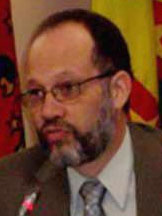CARICOM Secretary-General Ambassador Irwin LaRocque is calling on firms in this region to enhance their level of competitiveness through increased productivity and production and to embrace innovation.
The CARICOM Secretary-General pointed to services industries in particular and asserted that such initiatives would allow opportunities to be maximized within the CSME (CARICOM Single Market and Economy) as well as facilitate the exploitation of those being provided by the trade agreements the region has concluded.

LaRocque was speaking at the Annual General Meeting of the Trinidad and Tobago Coalition of Services Industries held at the Crowne Plaza Hotel in Port-of-Spain on Wednesday, according to a copy of his remarks made available by the CARICOM Secretariat at Turkeyen.
Supporting his call, the CARICOM Secretary-General contended that if firms were to pursue such a course, they would also be moving closer to achieving one of the principal goals outlined at the Special Heads Retreat in Guyana in May last year – that of job creation.
“It is clear that the private sector is a sine qua non to achieving the results from those priorities laid out by the Heads of Government,” LaRocque emphasized.
To realize the full potential of the Caricom Single Market, LaRocque said that there would have to be greater collaboration between the public and private sectors. He asserted that the community and its member states must strengthen ties with the private sector.
“It is becoming more and more evident that the time is now for a more structured interface between the regional public and private sectors and in doing so, to include other stakeholders such as labour”, LaRocque admonished.
At the Special Retreat in Guyana, CARICOM leaders had outlined the priorities and the vision they had for the Community, and the services sector was among the priority areas identified as key to the growth and development of the Community. The sector was also identified in the vision document produced by Professor Norman Girvan and others as one of the drivers of the regional economy in going forward, LaRocque recalled.
He noted also that the importance of the services sector to CARICOM member states is well documented and in recognition of this and the structural challenges within the sector, it was agreed in 2001 to facilitate the creation of service coalitions.
Service coalitions
“We now have ten such coalitions in the Community and the Trinidad and Tobago Coalition of Service Industries is undoubtedly one of the most vibrant of these (but) this is not surprising given the fact that the sector in Trinidad and Tobago is the second largest in the CSME after Jamaica,” LaRocque said.
He explained that the coalitions were established to represent the sector and its specific interests, support the development of the industry, including the setting of standards and to engage in export promotion and marketing. It also should provide an excellent opportunity for an interface between the private and public sectors.
LaRocque also pointed out that of all the sectors in the regional economy the largest is services.
“It accounts for more than 65% of total employment and output. The CSME collectively enjoys a surplus in trade in services with third countries which averaged approximately US$ 2.9 billion per annum during the period 2000 to 2008. This was fuelled primarily by the trade in travel services. More importantly that surplus helped to offset most of the deficit in trade in goods which occurred during the same period.”
Meanwhile, LaRocque highlighted that member states have agreed to develop a regional strategic plan for services and during the next two years the plans for seven sectors are to be rolled out: Financial Services; Information and Communications Technologies; Professional Services; Tourism Services; Education Services; Health and Wellness Services; and Cultural, Entertainment and Sporting Services.
In the meantime, LaRocque acknowledged that the region has also been attracting off-shore tertiary education institutions and increasing interest has been shown in the potential for Health and Wellness tourism.
Other areas of the sector that have potential for a significant increase in earnings, he added, include construction, creative industries, and financial and professional services.
He also asserted that the region’s cultural services are in great demand whether it is in the performing or visual arts.
“…we can do more to benefit from the global market in creative goods and services which reached US $593 billion in 2008, according to the Creative Economy Report (2010) by two United Nations Agencies.”
ICT
And a critical component to the success of this sector, LaRocque recognized, is the role of infrastructure services such as ICT.
“… ICT has been identified as the main driver of the phenomenal growth of the services sector recorded during the past two decades,” LaRocque said.
And citing national consultations currently taking place on a Draft Regional Policy for the Provision of Professional Services in the CSME, La Rocque said that major elements of these proposals include a definition of a professional, and the establishment of independent sector-specific regulators and regulations.
This will complement work that had been done on a Draft Professionals Bill for the CSME and proposals on these two pieces of work should be submitted to the Council for Trade and Economic Development at its meeting scheduled for July this year, the CARICOM Secretary-General disclosed.
Once these proposals are approved, he added, the Community would have a regulatory framework for the provision of professional services in the CSME.
He bemoaned that this process has taken so long but said efforts are being made to finalise this critical element of the operations of the sector.
He said further that under the 10th European Development Fund (EDF), 3.2 million Euros have been assigned to support the region in the development of the services sector.
“Of this sum approximately 960,000 Euros have been assigned to strengthen regional and national support organisations including but not limited to, Coalitions of Services Industries and Chambers of Commerce, to assist services suppliers and consumers.”





